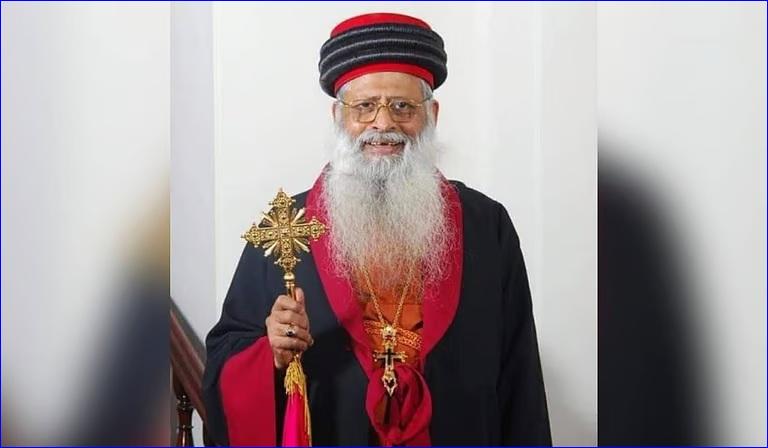


The funeral and other rituals will be decided after consulting with the Church leaders in Iraq, the Church sources in Thrissur said.
The metropolitan was born as George Mookken on June 13, 1940, in Thrissur, which was then in the Kingdom of Cochin under British India.
Educated in India, England, and America, Mar Aprem specialized in Church History. He obtained master's degrees in Church History from both the United Theological College, Bangalore, and the Union Theological Seminary, New York.
He studied theology at Leonard Theological College, Jabalpur. He was ordained a deacon on June 25, 1961, and a priest on June 13, 1965.
He was consecrated bishop on September 21, 1968, by Mar Thoma Darmo, Catholicos Patriarch of the Ancient Church of the East. He took the name Mar Aprem Mooken, and was promoted as a Metropolitan of the Ancient Church of the East eight days later in Baghdad.
In 1999, he rejoined the Assyrian Church of the East and was instrumental in healing the rift that had developed in the church over the question of hereditary appointments since the 1960s.
He served as the president of the Church History Association of India during 1976-1982.
Mar Aprem was a prominent personality in Thrissur. He promoted religious harmony. His speech, filled with fun and wisdom, had won several fans across Kerala.
He served as the head of the Assyrian Church of the East in India for about five decades.
He wrote some 65 books, prominent among them is his Syriac translation of Daiva Dashakam (Ten Verses To God: The Universal Prayer), a prayer Narayana Guru, a social reformer, wrote in 1914.
The poem does not address any specific deity from any particular religion. Instead, it invokes a universal, compassionate concept of God rooted in Advaita philosophy. In 2009, the Kerala government recommended it as the national prayer of India. It has been translated into at least 100 languages.
Mar Aprem had headed St. Ephrem Ecumenical Research Institute that collaborated with the Kerala government and the Central European University in Budapest to digitize 180 rare and ancient documents Syriac texts.
The metropolitan hailed the move as a historic achievement that would help establish the Syrian Christians link with Saint Thomas the Apostle.
The project aimed to catalogue and digitize the documents related to Christians who trace their faith to the apostle. It wanted to find out the roots of religious practices among these Christians who are now scattered in many denominations, including the Catholic Church.
The Assyrian Church of the East has its headquarters in Erbil, northern Iraq. Its official name is the Holy Apostolic Catholic Assyrian Church of the East, an Eastern Syriac Christian denomination that follows the traditional Christology and ecclesiology of the historical Church of the East.
It belongs to the eastern branch of Syriac Christianity, and employs the Divine Liturgy of Saints Addai and Mari belonging to the East Syriac Rite. Its main liturgical language is Classical Syriac, a dialect of Eastern Aramaic. Officially known as the Church of the East until 1976, it was then renamed the Assyrian Church of the East, with its patriarchate remaining hereditary until the death of Shimun XXI Eshai in 1975.
The Church claims continuity with the historical Church of the East, and is not in communion with the Catholic, Oriental Orthodox or Eastern Orthodox Churches.
The faction of the original Church of the East that came into full communion with the Holy See between the 16th and 19th centuries is the Chaldean Catholic Church. After the Common Christological Declaration in 1994 between the Church of the East and the Catholic Church, and a 2001 theological dialogue between the churches, they drew up guidelines for the faithful to have mutual admission to the Eucharist between the Chaldean Catholic Church and the Assyrian Church of the East.
The current Catholicos-Patriarch of the Assyrian Church of the East, Mar Awa III, was consecrated in September 2021.

or register to post a comment.